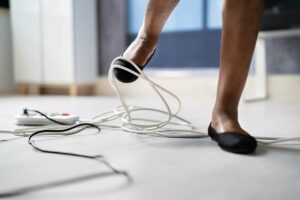Whether close to home or while on vacation, hot summer temperatures beckon many people to activities in and around water. To help ensure that the fun stays in these summer activities, it is important to keep safety in mind. Safe Electricity shares tips to help keep you and your loved ones safe when enjoying water recreation activities this summer.
Before spending time on the water, be sure to check weather forecasts and stay up to date on the possibility of storms. Postpone your plans if a thunderstorm is expected, as the risks for lightning strikes are especially high in or near bodies of water. Remember the advice from the National Weather Service (NWS), “When thunder roars, go indoors.”
You are not safe from lightning strikes while outside, so once you hear thunder, immediately get out of any body of water. “With the first signs of a storm, head for the shore,” says Natalie Hemmer, Safe Electricity Advisory Board member. “Get to a safe shelter, such as an enclosed building with electricity or plumbing or an enclosed metal-topped vehicle with its windows up. Wait until at least 30 minutes have passed without thunder to return outside.”
Also be aware of your surroundings and look out for potential hazards. Always check the location of nearby power lines before boating or fishing and make sure you are casting your line away from power lines to avoid potential contact.
Contact between your boat and a power line could be devastating. Do not raise a mast or antenna when your boat is near a power line. Never attempt to move a power line out of the way so that a boat can pass underneath. Maintain a safe distance of at least 10 feet between your boat and nearby power lines.
Keep in mind that water levels are constantly changing, altering the distance between the water and the line. Do not assume that you can safely pass under a power line just because you have in the past.
If your boat comes in contact with a power line, do not enter the water. The water could be energized. Instead, stay in the boat and avoid touching anything metal until help arrives or until your boat is no longer in contact with the line.
Do not swim around docks with electrical equipment or boats plugged into shore power. If you are in the water and feel a tingle of electric current, shout to let others know, try to stay upright, tuck your legs up to make yourself smaller, and swim away from anything that could be energized. Do not head to boat or dock ladders to get out.
If you see someone who you suspect is getting shocked, do not immediately jump in to save them. Throw them a float, turn off the shore power connection at the meter base and/or unplug shore power cords. Try to eliminate the source of electricity as quickly as possible; then call for help.
To help prevent the risk of electricity entering the water, have your boat and dock electrical systems regularly inspected and maintained by a professional familiar with marine electrical codes.
To learn more about electrical safety, visit SafeElectricity.org.









